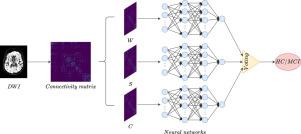Pattern Recognition Letters ( IF 5.1 ) Pub Date : 2020-06-06 , DOI: 10.1016/j.patrec.2020.06.001 Eufemia Lella , Gennaro Vessio

|
In this paper, we propose a novel method for mild cognitive impairment detection based on jointly exploiting the complex network and the neural network paradigm. In particular, the method is based on ensembling different brain structural “perspectives” with artificial neural networks. On one hand, these perspectives are obtained with complex network measures tailored to describe the altered brain connectivity. In turn, the brain reconstruction is obtained by combining diffusion-weighted imaging (DWI) data to tractography algorithms. On the other hand, artificial neural networks provide a means to learn a mapping from topological properties of the brain to the presence or absence of cognitive decline. The effectiveness of the method is studied on a well-known benchmark data set in order to evaluate if it can provide an automatic tool to support the early disease diagnosis. Also, the effects of balancing issues are investigated to further assess the reliability of the complex network approach to DWI data.
中文翻译:

结合复杂的网络“观点”,使用人工神经网络检测轻度认知障碍
在本文中,我们提出了一种基于联合开发复杂网络和神经网络范式的轻度认知障碍检测的新方法。特别地,该方法基于利用人工神经网络整合不同的大脑结构“观点”。一方面,这些观点是通过为描述改变的大脑连通性而量身定制的复杂网络措施获得的。反过来,通过将弥散加权成像(DWI)数据与物镜检查算法相结合来获得大脑重建。另一方面,人工神经网络提供了一种学习从大脑的拓扑特性到存在或不存在认知下降的映射的方法。为了评估该方法是否可以提供支持早期疾病诊断的自动工具,在众所周知的基准数据集上研究了该方法的有效性。另外,还研究了平衡问题的影响,以进一步评估DWI数据的复杂网络方法的可靠性。


























 京公网安备 11010802027423号
京公网安备 11010802027423号